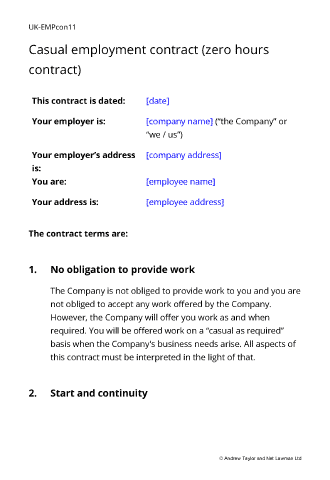Sometimes you need to hire staff on an ad-hoc basis without any guarantee of continuous employment or even of a certain number of hours work.
A zero hours contract (or casual employment contract or 0 hour contract) regulates this arrangement.
What is a zero hours contract?
A zero hours contract differs from a standard employment contract in that a zero hours contract gives no obligation to the employer to offer the employee work (where the term 'zero hours' comes from) nor for the zero hours worker to accept all or any of the work offered.
If you have no work for someone you hire on a zero hours basis then you aren't obliged to pay them if there is no work.
Otherwise, zero hour contracts contain the same provisions as employment contracts including terms relating to such things as place of work, annual leave, pay and termination arrangements.
Exclusivity clauses in zero hours contracts may be included but are unenforceable.
Law relating this zero hours contract and casual employment
Are people I hire on zero hours contracts classed as workers or employees?
Both workers and employees can be hired using zero hours contracts. Which they are depends largely on their employment status and not on the type of contract.
Employment status depends on the circumstances of work including the frequency of hours worked and the type of work.
Under UK employment law, the basic rights of all workers and employees are the same regardless of their employment status or whether they work full-time or part-time. Workers on zero hours contracts have many of the same basic employment rights and entitlements as regular workers.
These rights include annual leave, being paid the National Minimum Wage and the National Living Wage and being paid for work-related travel. Nor can a default retirement age be specified in the contract.
Workers don't have some rights of employees. For example, to claim for unfair dismissal, paternity and maternity pay and leave, flexible working or statutory minimum notice.
Can an employment relationship arise under a zero hours contract?
Our zero hours contract demonstrates the employer's intention to enter into a 'worker' relationship.
A worker may become a part-time or full-time employee with enhanced rights. Whether that happens is often subjective and may require any dispute over status to be decided by an Employment Tribunal.
Terminating a zero hours contract
An employer can end the agreement immediately if the worker has committed gross misconduct or a serious breach of the terms.
A worker can terminate a zero hours contract by giving notice in writing to the employer that they no longer wish to be a casual worker.
When to use a zero hours employment contract?
This zero hours contract is suitable:
for any new employee working on 0 hours or casual basis
for temporary work where demand fluctuates, for unexpected or last-minute work, or for on-call or bank work
If you hire a freelancer, a zero hours contract may be more attractive to them. Zero hours contracts give more rights and legal protection than a contract for services, so they can help recruit workers with whom you want a longer-term yet flexible working relationship.
Why use this zero hours contract template?
This zero hours contract template provides a superb, clear framework for fair and full protection of the employer and compliance with organisational requirements.
It covers all legal requirements to give information to a worker, and provides for variable hours, pro-rata holidays and sickness benefits. Performance reviews and grievance procedures are also covered. All our employment contracts give strong protection of confidential information.
Disciplinary procedures follow ACAS recommendations.
Use of plain English makes editing easy and allows the agreement to be understood by all parties.
Features of this zero hours contract
- Up-to-date and complies with current law
- The employer has no obligation to provide work
- Includes all standard terms for a principal statement
- Follows current best practice recommendations by ACAS and other bodies
- Strong protection of employer's confidential information
- Use for any job role
- Structured to minimise the administrative burden of legal compliance
Contents of this zero hours contract template
This zero hours contract covers:
- No obligation to provide a set number of hours of work
- Start and continuity
- Trial period (also called a probation period)
- Job title and description
- Place of work
- Work outside the UK
- Hours of work
- Salary
- Expenses
- Leave for holidays and other reasons
- Sickness and sick pay
- Pension
- Other business and employment
- No competition
- Confidentiality
- Intellectual property
- Collective agreements
- Staff handbook and company policies
- Bribery and other corrupt behaviour
- Disciplinary and grievance procedures: in line with ACAS recommendations
- Termination
- Reconstruction or amalgamation
- Data protection
- Severance and invalidity
Practicalities this zero hours contract template covers
A contract, written or verbal is made as soon as the employee accepts a job offer. We recommend providing a written contract with the offer letter, asking the employee to return the acceptance letter with a signed copy of the contract.
By law, you must give all employees, whether zero hour workers or full time employees, a 'written statement of employment particulars' no later than the day of starting work. This document gives the terms of employment that the employer must disclose, known as a 'principal statement'. Using this zero hours contract, you don’t need to provide this necessary information separately.
Other employment policies and procedures (such as data protection) could be included in this zero hours contract. However, when you have many zero hours workers, changing each employee’s contract of employment (and ensuring consistency between employees) when the law changes can be time consuming and difficult. Usually, all common procedures and policies are placed in an employee handbook to which employment contracts refer.








